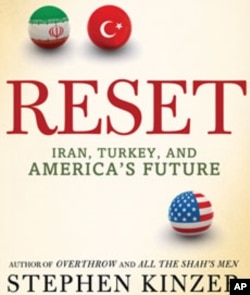Israeli Prime Minister Benjamin Netanyahu has been visiting Washington and New York. He met with U.S. President Obama and U.N. Secretary-General Ban Ki-moon, to discuss issues, including the Middle East peace process. Mr. Obama said the Israeli leader showed a willingness to engage in serious talks with the Palestinians. Mr. Netanyahu said it was time for direct talks between Israel and the Palestinians to begin.
However, Stephen Kinzer, a journalist and author of the book Reset: Iran, Turkey, and America’s Future, which looks at conflict resolution in the Middle East, believes another approach should be taken to resolve the conflict. VOA’s Susan Yackee asked him what new policies the United States could pursue to help stabilize the region.
Kinzer: I start from the idea that our policies are really stuck in the past. We have a policy designed to confront the Middle East of the Cold War, but the Cold War's been over for more than 20 years and our policy is stuck in the past. So I feel that we need new ideas and creative thinking and "out of the box" approaches to that region. That's my first conclusion.
The second is, as we approach that region in a new way to try to promote our own interests and the interests of stability in the Middle East, we would be wise to look for partners and not try to do it all ourselves and assume that only we have the good ideas in the Middle East.
And my third is, who would those partners be? If you look around that region and ask yourselves, "Which countries have long-term strategic goals that are similar to ours and also have societies that are similar to ours?" The only two Muslim countries in the Middle East that fulfill those criteria are Turkey, and surprise, Iran. So, I think in the future, in the 21st century, you're gonna see the emergence of this power triangle: U.S., Turkey, and Iran.
Yackee: But why should the U.S. pursue a partnership with Turkey and Iran?
Kinzer: There are different reasons for the both of them. I think in both cases, you see societies that are open and democratic and eager to engage with the rest of the world. In Iran, you don't see a government that encourages that but the society in Iran, as I found in my recent visit there last month, is amazingly vibrant and democratic. But over the long run, what about strategic goals? So it's not a hard sell to say that Turkey and the U.S. have closely linked strategic goals.
After all, we've been NATO allies with them for decades. But what about Iran? Isn't it a little counterfactual to think of the U.S. in a strategic partnership with Iran? I'd suggest this: First of all, Iran has a great ability to stabilize Iraq. They can do more to stabilize Iraq than anyone else, particularly in cooperation with the Turks who have very good ties to the Sunni factions there. So if we want to get out of Iraq, without another explosion of violence there, Iran is a vital partner and also has the great ability to stabilize Afghanistan on the other border.
Iran, of course, has long relations with Afghanistan and a lot of Afghanistan used to be a part of Iran up until Iran lost a few wars in the 19th century. Iran is eager to ensure the free flow of energy resources from the Persian Gulf to the West. Iran is the bitter enemy of radical movements like Taliban and al-Qaeda.
So when you look forward and put aside the prejudices of the moment, you think about state interests, which don't change when regimes change, you see that Iran's long-term state interests, along with its vibrantly democratic society, if not government, make it a very intriguing potential partner for the United States.
Yackee: Well, should the U.S. rethink its relationship with Israel?
Kinzer: I think it is right for the U.S. to maintain a long-term strategic partnership with Israel, but when I was in Israel researching this new book I have, I did find a new growing body of opinion in Israel and I think it's also reflected in the United States. It's asking themselves, "Are our political leaders able to make decisions that really guard our security over the long run or are we taking steps that seem to defend ourselves right now, but may undermine our security in the long run?"
So, I'd like to see the United States adopt a view that in the long run, Israel is not going to be able to defend itself forever with only military means. The best guarantee for Israel's long-term security is a calm neighborhood.
Therefore, anything the United States or anyone else from outside the region does in the Middle East that helps stabilize that region and diffuse confrontation is actually good for Israel in the long run.
Yackee: Could Turkey be the arbitrator in the Israeli-Palestinian conflict?
Kinzer: I hope so and I fear that the confrontation over Turkey and Israel over this Gaza flotilla in recent weeks might weaken that possibility. That's a very bad idea. Turkey is caught up in a lot of emotion now, because their citizens were killed on the high seas and there's a lot of anger about what's happening in Gaza.
But Turkey should not pick up one of the bad habits of the United States. One of our bad habits is that we make our foreign policy often based on emotion without stopping to think about what's really in our long-term interests.
Turkey's in an emotional state about Israel now, but actually the Turkey-Israel relationship is so important for the Middle East. Israel needs a Muslim country as a bridge out of its isolation. Only Turkey can play that role because of its long relationship with Israel. Turkey needs to ratchet down its feelings of anger and confrontation and realize that since it also wants a stable Middle East, it needs to maintain a good relationship with Israel.





